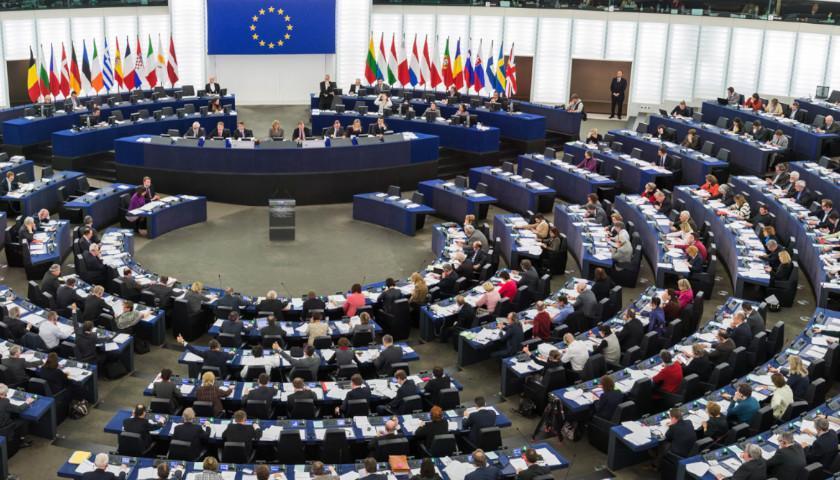by Eric J. Lyman
The dramatic gains by right-wing and nationalist parties in this past weekend’s voting across Europe for a new European Parliament has left leaders of the region most powerful countries reeling while emboldening Italian leader Giorgia Meloni.
However, whether the results are a harbinger for the November elections in the United States remains uncertain.
In Germany, home to the EU’s largest economy, gains by the center-right Christian Democrats, projected to with at least 30% of the vote, and the extreme-right Alternative for Germany, second with 16%, was what Politico described as a “humiliating” setback for Chancellor Olaf Scholz’s coalition, casting doubts on its viability.
Scholz’s Social Democrats recorded their worst result in a national vote in more than a century, Politico also reports.
Alternative for Germany capitalized on voters’ growing concerns about the huge influx of asylum seekers in the past decade, similar to concerns in the United States, where this fall Democratic incumbent President Biden, whose reelection campaign has been plagued by a border-immigration crisis, will likely face a rematch with Republican candidate Donald Trump, a border-illegal immigration hawk.
The vote for the new European Parliament was felt deeply across the 27-nation bloc.
Liberal Belgian Prime Minister Alexander De Croo called himself an “outgoing prime minister” while in Spain, Socialist Prime Minister Pedro Sanchez suffered a major blow after gains by multiple parties on the country’s right.
Despite the gains for the right-wing and nationalist parties, centrist and progressive parties will remain in control of the 720-member European Parliament (albeit with a smaller majority), and European Commission President Ursula von der Leyen is likely to stay on as the bloc’s executive.
But Vincenzo Emanuele, a political scientist and vice-director of the the Center for Italian Electoral Studies at Rome’s LUISS University, said that the change in the makeup of the legislature will make a significant difference.
“The new European Parliament will clearly have to take more right-wing priorities into consideration,” Emanuele told Just the News.
One of the priorities that could make a big difference, Emanuele said, is European aid to Ukraine, something a lot of the newly emboldened parties oppose.
“It will take a while for changes to happen since these things move slowly,” Emanuele said. “But it’s safe to say these results weren’t welcome news in” the Ukrainian capital of Kiev.
The big stories that emerged after four days of voting came from France and Italy.
French President Emmanuel Macron, whose Renaissance party earned half as many votes as Marine Le Pen’s far-right National Rally, took a dramatic roll of the dice when he called for snap national elections starting later this month, a vote that will conclude just before the start of the 2024 Olympics in Paris.
If that vote produces results anything like the latest election, Macron would be hobbled for the remainder of his term, and he could be forced to resign.
The result in France came soon after Macron led a high-profile celebration of the 80th anniversary of the D-Day invasion in Normandy with scores of dignitaries on hand, including Biden.
In fact, Macron hosted Biden for an official state dinner in Paris as the French were casting their ballots and the results of the French vote became known only an hour after Biden departed for Washington on Air Force One.
Further south, Meloni, Italy’s right-wing firebrand who was once dismissed as a fringe figure not to be taken seriously, may have emerged from the latest vote as the leading political figure in Europe.
Meloni – who became Italy’s first female prime minister after a campaign based on polarizing issues including migration, skepticism of the European Union, gay marriage, and putting Italian national interests first – on Monday boasted “We have the strongest government in the G-7,” referring to the seven-nation club of large industrialized economies Italy is heading this year.
Meloni’s Brothers of Italy party increased its vote share compared to the 2022 election that put her in office.
In addition to Italy, France, and Germany, the G-7 includes Canada, Great Britain, and Japan – all of which are headed by wounded governments with low approval levels – and the U.S., which by all accounts is heading for another razor close election in November.
The results may boost Meloni’s effort to emerge as Europe’s unofficial de facto leader, a role previously played by France’s Macron and Germany’s Scholz. That trend led Foreign Policy to declare last month that the Italian leader “no longer wants to leave the European Union, she wants to control it.”
While some political observers suggest the EU results suggest Trump could ride their political tailwinds to victory, other point out centrist and progressive parties still remain in control of the European Parliament.
– – –
Eric J. Lyman is a reporter for Just the News.
Photo “European Parliament” by Diliff CC BY-SA 3.0.



